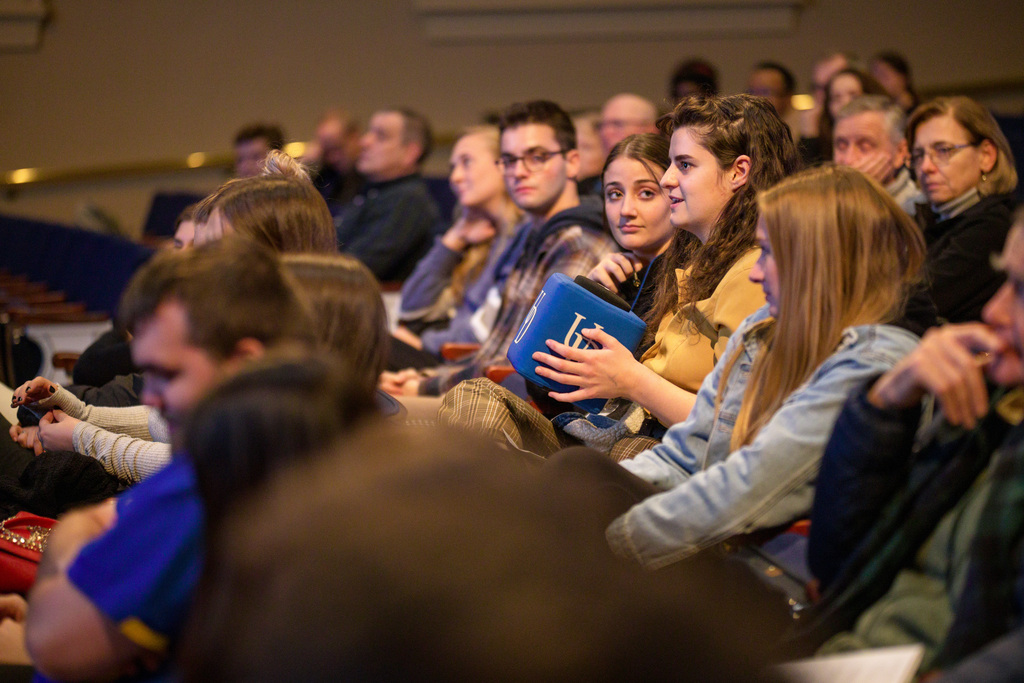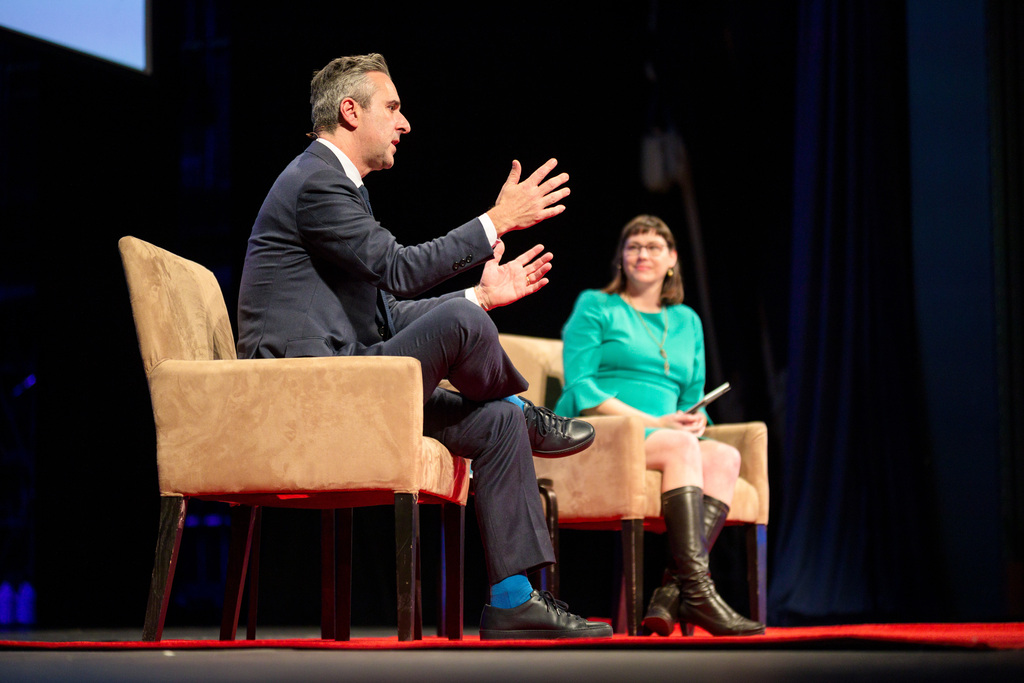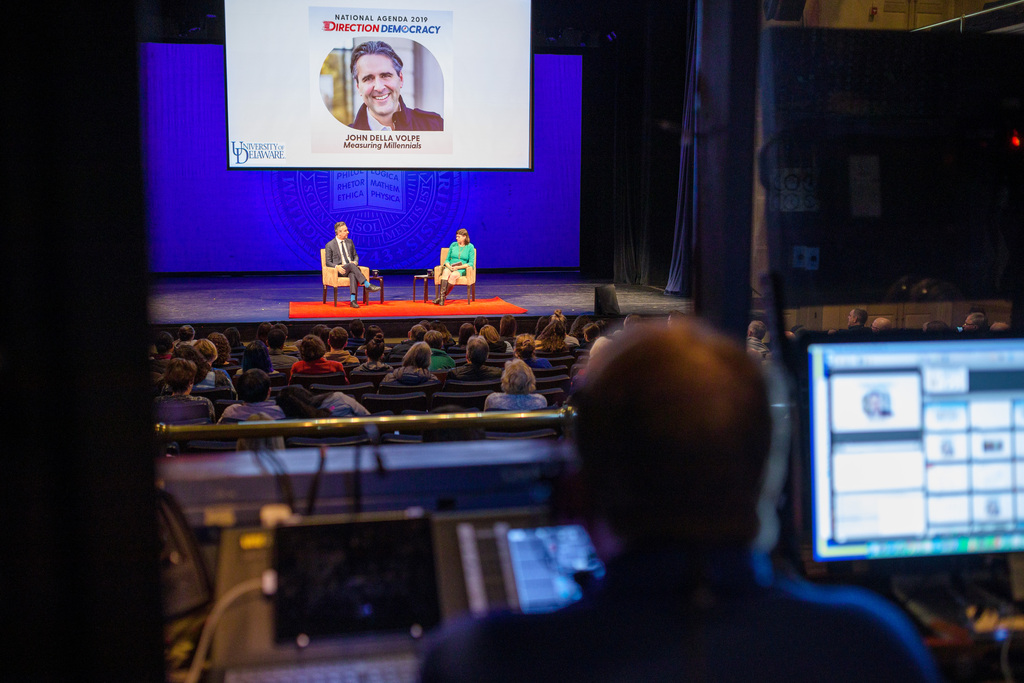National Agenda with John Della Volpe : Measuring Millennials
Harvard pollster: “What keeps young people up at night?”
By Justin Richards, University of Delaware junior and intern for the University of Delaware’s Center for Political Communication
Watch the video. Listen to the podcast. Read the transcript. Read the story in The Review.
DECEMBER 11, 2019″John Della Volpe’s job is to ask questions, and he spends a lot of time thinking about Millennials. At the final event of the University of Delaware’s National Agenda speaker series on November 20, he queried, “What keeps young people up at night?? UD junior Alyssa Hornung stood up. “I”m angry because I didn’t choose a lot of the things that I have to deal with. When I chose between colleges, I chose between $10,000 of debt a year to up to $40,000 in debt a year for the majors that I wanted to go to school for. And I”m angry that my family is a couple of medical emergencies away from bankruptcy and these were not decisions that I made, they’re just repercussions that I have to deal with. So, when I sound emotional, there are reasons why I get emotional.”
Hornung’s comment confirmed the observations of Della Volpe, the director of polling for Harvard Kennedy School’s Institute of Politics. “I hear tremendous amounts of anxiety and stress, and many times, anger.”
Della Volpe began polling young people 20 years ago after two Harvard students, frustrated with low voter turnout among young people, came to the Institute of Politics and asked, “Don’t our peers realize that if they volunteer and vote we can move the country ahead that much faster?? The one-semester project of studying young voters between 18-29 has become the Harvard Youth Poll, with 38 polls completed over the past 37 semesters.
The Washington Post called Della Volpe one of the world’s leading authorities on global sentiment, opinion and influence especially among Millennials. Della Volpe is the founder of SocialSphere, a public opinion and analytics company. He has appeared on national media outlets such as MSNBC’s Morning Joe and The Daily Show with Trevor Noah.
Young people confront divisive politics, demand action

The National Agenda talk was perfectly timed with the release of Harvard’s recent 2019 youth poll and the Democratic Primary Debate on the same evening. Della Volpe used the poll’s results to provide context on the generational, cultural, and political divides throughout America. Among the most striking findings, said Della Volpe, “This generation has been the only generation that I”ve seen in our polling and other polling to support impeachment and removal.”
There has been an overall decrease in Republicans among younger generations. “We”ve seen about a 10-percentage point decrease in the number of self-identified Republicans over the last several years,” said Della Volpe. “I think what we”re finding is that this increase in partisanship has reduced the number of Republicans, increased the number of Democrats and independent-leaning, kind of blue voters.” Harvard poll results find President Trump’s approval rating to be “pretty consistently below 30 percent every semester since we”ve polled. But you have approval ratings in the mid-60s and higher among young Republican voters,” said Della Volpe.
“I often times find I spend my time as an interpreter or diplomat or ambassador from younger to older generations.” Della Volpe provided context on why there are so many differences between the Millennial generation and Baby Boomer Generation. Historic events over the past 20 years have profoundly impacted 18- to 29-year-old voters and expanded the generational differences. “The older voters were about two points more likely to be Democrats than younger voters back in 2000. We then had 9/11, we had Katrina, we had a recession, we had school shootings, etc. Now in 2018 that plus-two advantage for Democrats among older people is a 36-point net disadvantage. What that means is there’s a 38-point swing in public opinion between 2000 and 2018,” said Della Volpe. “Young people were two points less likely to be Democrats; they are 36 points more likely to be Democrats today.”
The Millennial generation continues to be the most active, with 32 to 33 percent voting 2018 versus 16 percent in 2000. They have also been one of the most impactful as seen in recent events. Millennials are the “largest, most progressive and the most active. And a political force not just in this country actually, I”d argue, but around the world,” said Della Volpe. “Young people feel empowered not just here but around the world and they”re changing how we operate in the public as well as in the private sphere.”
He listed significant events in 2019 that were fueled by youth activism: the Hong Kong protests in June; protests in Puerto Rico that led to the governor’s resignation in July; the decision in August of major retailers Dick’s Sporting Goods and Walmart to stop selling certain kinds of assault weapons; the September presidential debate that focused on healthcare; Greta Thunberg’s climate strike and UN Climate Summit speech in September; Chilean protests in October; and Lebanese protests in October.
Accuracy of polls

Della Volpe addressed the perceived faults among the public in the field of polling. He stated that a pollster’s credibility is incorrectly tied to how many polls they get right. “If a venture capitalist is right three out of ten times, they are retired by the time they’re 50 years old. The same thing with a baseball player. Same thing with the weather. You know? But a pollster is supposed to get it right, what, 99 out of 100 times or 100 times out of 100 just to basically live to conduct another poll.”
He remarked that polls should not be used to predict the future, that they are only ‘snapshots of a particular moment.” That what some may say were errors in the 2016 Election, Della Volpe said that was not the case with national polling. “I often remind my friends that it was as accurate as it has ever been.”
The national polls indicated that 2016 presidential candidate Hillary Clinton won the popular vote by less than half a point. But many state-based polls that tracked the 2016 presidential election”in places like Michigan and Wisconsin”had it wrong. “There’s just not a lot of work in those states. Most of the national organizations don’t invest in polling so you have local organizations, local media, local colleges who often don’t have the resources to poll on a regular basis to conduct the same kind of rigorous kind of sampling as we would on a national basis,” Della Volpe said. “But the biggest factor was that a major part of the Trump voting base which [have] not typically voted in previous elections was missing from those samples … So, not a lot of polling; not a lot of investment in polling, and, a changing electorate that no one was really prepared for.”
Della Volpe looks for national polls with a margin of error around three and a half percent. Therefore, the poll would be around 1,000 participants allowing for multiple points of analysis. “Margin of error is important to look at the top line but you want to get as many people represented in a survey as possible so you can look at some of the important subgroups,” Della Volpe explained.
Della Volpe also reminded the audience to be aware of the “herding effect.” With the Iowa Caucuses and New Hampshire Democratic Presidential Primary less than three months away, things can change rapidly on the ground with many polls being potentially manipulated in one instance or another to make it out to what pollsters were expecting. “Sometimes an outlier is right. So, don’t just discount the outlier just because they are an outlier.”
Della Volpe closed by emphasizing the need for civics education, critical thinking, multiple perspectives, and civil dialogue in a political climate where many people find themselves in media silos. “I think we should all do the best we can to at least, nothing’s perfect but at least try, to get different perspectives to understand our neighbors and our family better if nothing else.”
About National Agenda

The National Agenda speaker series, hosted by the University of Delaware’s Center for Political Communication, brings nationally known speakers to campus and encourages students, staff, faculty, and community members to join the conversation. CPC Associate Director Lindsay Hoffman, an associate professor of communication at UD, directs the series. This year’s theme, “Direction Democracy,” explores where we have been, where we are going, and the current state of democracy in the United States. National Agenda is free and open to the public. It is made possible with support from the University of Delaware’s Office of the Provost and the College of Arts and Sciences. For more information, please visit cpc.udel.edu/nationalagenda.
